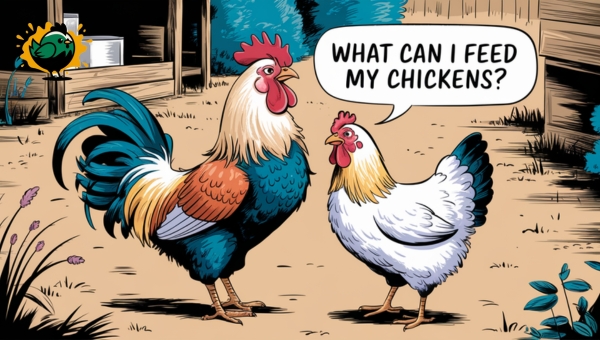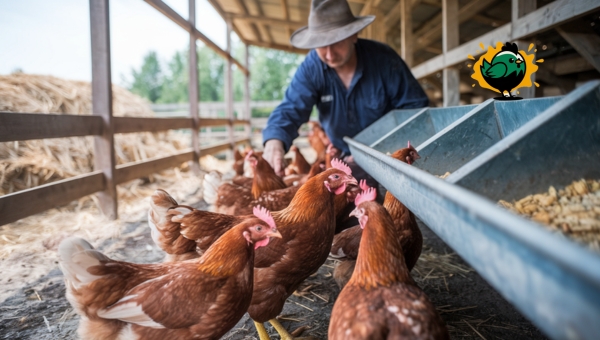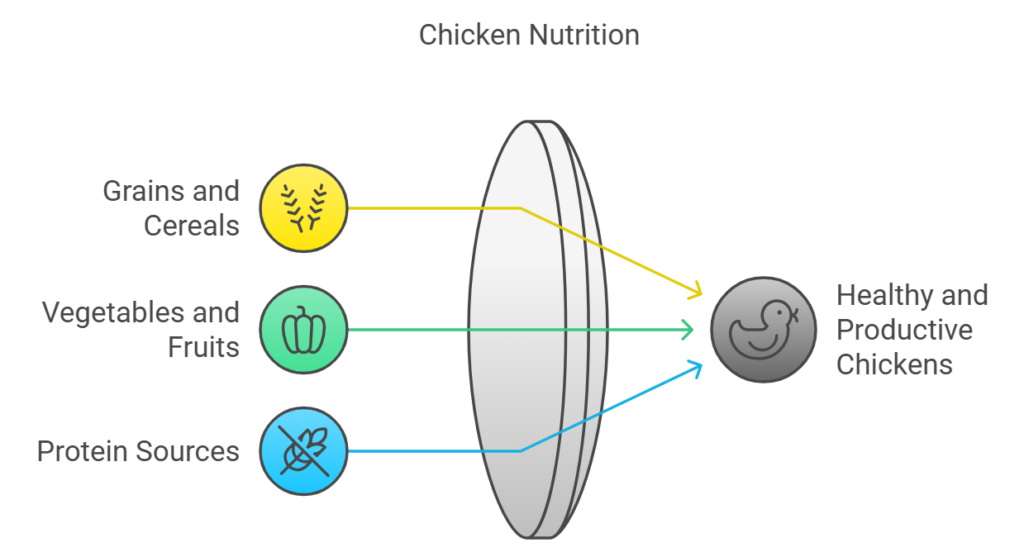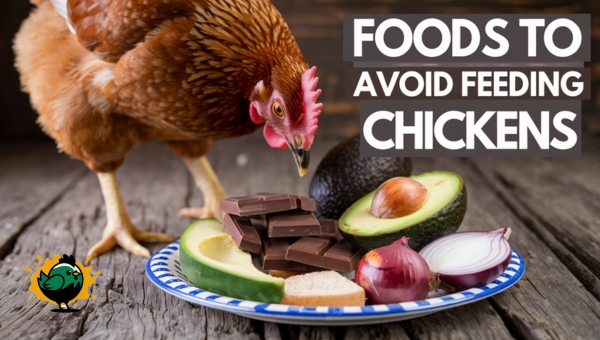What Can I Feed My Chickens? Essential Guide

Envision your hens, excited for their morning food, softly clucking as you awaken. Think about what you can give your hens to keep them healthy and productive as you go outside to greet them. Providing the right diet is crucial for their well-being and egg production.
This guide will help you understand their dietary needs and explore the best foods to offer. From grains to vegetables, and protein to supplements, we’ll cover it all. Whether you’re a seasoned poultry keeper or just starting, this article will equip you with the knowledge to nourish your flock effectively and ensure they thrive.
Understanding Chicken Dietary Needs
When it comes to caring for chickens, understanding their dietary needs is essential. Chickens, like all animals, require a balanced diet to thrive. Proper nutrition not only impacts their health but also their productivity, especially for those raised for eggs or meat. Let’s explore what chickens need in their diet to ensure they stay healthy and productive.

Nutritional Requirements
Chickens have specific dietary needs that must be met to maintain their health. They require a mix of carbohydrates, proteins, fats, vitamins, and minerals. Carbohydrates provide them with the energy necessary for daily activities and growth.
Proteins are crucial for muscle development and egg production. Essential fats contribute to energy and the absorption of fat-soluble vitamins. Vitamins and minerals, such as calcium and phosphorus, play a vital role in bone health and eggshell formation. By meeting these nutritional needs, chickens can lead healthy, productive lives.
Common Staple Foods for Chickens
When it comes to feeding chickens, understanding their staple food sources is key to ensuring their health and productivity. These foods provide the essential nutrients that chickens need to thrive.

Let’s take a closer look at some of the most common staple foods that you can include in your chickens’ diet.
Grains and Cereals
Grains and cereals form the foundation of a chicken’s diet, providing them with energy and essential nutrients.
Common grains and cereals include:
- Corn: A popular choice, offering carbohydrates and energy.
- Wheat: Provides protein and fiber, supporting growth and digestion.
- Barley: Helps with digestion and offers a good energy source.
- Oats: Rich in fiber and beneficial for maintaining chicken health.
Vegetables and Fruits
Incorporating vegetables and fruits into a chicken’s diet adds variety and important vitamins. These can improve the overall health and well-being of your flock.
Some options are:
- Carrots: High in vitamin A, promoting healthy vision and immune function.
- Spinach: Packed with iron and vitamins, supporting strong bones.
- Pumpkins: Rich in fiber and antioxidants, aiding digestion.
- Apples: Offer natural sugars and fiber, which are beneficial for energy.
Protein Sources
Protein is essential for growth and egg production in chickens. It is important to include a variety of protein sources in their diet, such as:
- Soybean Meal: A high-protein option that supports muscle development.
- Fish Meal: Offers omega-3 fatty acids and aids in egg quality.
- Mealworms: A natural and tasty source of protein that chickens enjoy.
- Peas: Provide plant-based protein and are a great alternative to animal proteins.
Each of these food categories plays a crucial role in maintaining the health and vitality of your chickens. By including a mix of grains, vegetables, fruits, and proteins, you can support their nutritional needs effectively.
Also Read: Can Chickens Eat Eggshells? You Won’t Believe the Answer
Supplements and Special Additives
When feeding chickens, it’s not just about grains and vegetables. Supplements and special additives play a crucial role in ensuring your chickens lead healthy and productive lives. They provide essential nutrients that might be missing from the regular diet.
Calcium Sources
Egg-laying chickens require a significant amount of calcium to produce strong eggshells. Without adequate calcium, chickens can lay eggs with thin shells, leading to breakage and other health issues.
Here are some excellent calcium sources:
- Crushed Limestone: A common supplement that provides a steady calcium supply.
- Calcium Carbonate: Often found in commercial layer feeds to boost calcium intake.
- Bone Meal: An organic option that also provides phosphorus.
Grit and Oyster Shells
Grit and oyster shells are essential for aiding digestion and strengthening eggshells in chickens. Grit helps chickens grind up food in their gizzard, crucial for proper digestion, while oyster shells are a great source of calcium.
- Grit: Small stones or sand particles that aid in grinding food.
- Oyster Shells: Provide a sustained release of calcium as they slowly dissolve.
- Commercial Grit Mix: Often contains a blend of grit and other minerals for optimal digestive health.
By incorporating these supplements and additives, you can help maintain your chickens’ health and productivity.
Foods to Avoid Feeding Chickens
When considering what can I feed my chickens, it’s equally important to recognize foods that should be avoided. Certain items can pose health risks to your flock, leading to issues ranging from mild discomfort to severe illness. Understanding these harmful foods is crucial for maintaining a healthy and productive flock.

Harmful Foods
To ensure your chickens stay healthy, avoid feeding them the following:
- Avocado: The pit and skin contain persin, which can be toxic to chickens.
- Chocolate: Contains theobromine, which is harmful to many animals, including chickens.
- Onions: Can cause anemia or jaundice in chickens, impacting their health.
- Raw Beans: Uncooked beans contain hemagglutinin, a toxin dangerous to chickens.
- Green Potatoes and Tomatoes: These contain solanine, which is toxic if ingested.
- Citrus Fruits: High acidity can interfere with calcium absorption and affect egg production.
- Moldy or Rotten Food: Can lead to digestive issues and other health problems.
- Salty Foods: Excessive salt intake is harmful and can lead to salt poisoning.
By being mindful of these foods, you can help keep your chickens safe and healthy. Always provide them with a balanced diet to support their well-being.
Also Read: Can Chickens Eat Pumpkin? Find Out the Benefits and Tips!
Tips for a Balanced Chicken Diet
When it comes to feeding chickens, ensuring a balanced diet is essential for their overall health and productivity. Providing the right nutrients in the right quantities will help in maintaining healthy growth and optimal egg production. Let’s explore some effective strategies to keep your chickens well-fed and thriving.
Dietary Balance Strategies
To maintain a balanced diet for your chickens, consider these strategies:
- Variety of Grains: Incorporate a mix of grains like corn, wheat, and barley. These grains provide essential carbohydrates and are a staple in their diet.
- Inclusion of Greens: Fresh vegetables such as leafy greens and carrots can provide vitamins and minerals. These are crucial for their immune system and overall well-being.
- Protein Sources: Ensure they have access to protein-rich foods. Options include mealworms and cooked eggs, which are excellent for muscle growth and feather development.
- Calcium Intake: For egg-laying hens, include calcium sources like crushed eggshells or commercial supplements to support strong eggshells.
- Clean Water Supply: Always provide fresh and clean water. Hydration is vital for digestion and nutrient absorption.
By following these strategies, you can offer a well-rounded diet that supports healthy growth and productivity in your chickens. Regularly assessing their diet and making necessary adjustments will ensure they receive all the nutrients they need.
Conclusion
Feeding your chickens the right diet is essential for their health and productivity. By understanding their nutritional needs, you can ensure they receive a balanced diet comprising grains, vegetables, fruits, and protein sources.
Remember to include necessary supplements like calcium and grit to aid in digestion and egg production. Avoid harmful foods that could jeopardize their well-being. A well-rounded diet will keep your chickens healthy and happy. In summary, paying attention to their dietary needs can lead to better egg quality and overall vitality.
For more insights and tips on raising healthy chickens, explore more of our informative blogs on the site. Your chickens will thank you!
